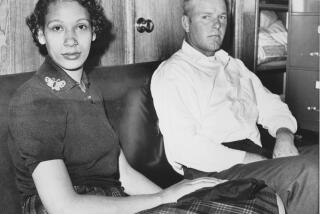Revive Courtship for Seeking Love
- Share via
Last Tuesday’s television program “Who Wants to Marry a Millionaire” hit a new low, trivializing marriage as entertainment. But the huge size of its audience--23 million viewers, many of them women under 35--suggests that many young people are very interested in marriage but clueless about how to get there on their own. We have a more reliable suggestion: Let’s revive courtship.
Many American collegians, increasingly dissatisfied with commitment-free sex, seem ready for a sexual counter-revolution and a return to the kind of romance that leads to marriage. More and more of the students we teach every day, especially young women, are owning up to their personal unhappiness with the hook-up culture and admitting deep longings for enduring happiness. Former students, having bumbled along through their 20s and 30s from one bad relationship to the next, report that they now want love-filled marriage. Unfortunately, current custom and sophisticated opinion have little to offer them.
In earlier days, courtship knew the goal and provided the path. Taking erotic love of man and woman as its starting point, it sought to discipline love in the direction of marriage. By holding back satisfaction of sexual desire, courtship used desire’s energy as romantic attraction to inspire admiration and devotion. It also provided opportunities for learning about one another’s character. Most important, courting helped the couple practice the attentiveness, dependability, care, exclusiveness and fidelity that they would later promise each other when they finally wed.
Courtship thus provided early practice in being married--a practice very different from that now provided by premarital cohabitation, a high-autonomy, low-commitment arrangement that prepares one mainly for conditional and transient attachment.
Reviving courtship faces numerous obstacles: casual and loveless sex, preoccupation with careers, diminished regard for marriage, fear of intimacy and of giving your heart, lack of trust and the discouraging examples of divorced parents. These and other causes produce skepticism about the prospects for lasting love.
In a class we are offering on courtship, we have heard students say: “The thought of living with the same person for 50 years is simply incredible!” “We are not supposed to get married until we are at least 28, so we know from the beginning of all our sexual relationships that they are supposed to be impermanent.” “Casual sex, with lots of men, gets the sex thing out of the way, so that women can, as never before, get to know men as friends.” Listening to such talk, one might be expected simply to toss in the towel.
Yet, beneath these students’ self-protecting cynicism are deep longings for friendship, for a life that is serious and deep and for associations that are trustworthy and lasting--longings that they do not yet realize could be satisfied by marrying well. The young are mainly just scared, and no one offers them hope or proper guidance.
What they need is a richer kind of sex education, beyond plumbing and prophylaxis. By elevating and inspiring the imagination with images of beauty and speeches of dignity, true sex education prepares hearts and minds for romance leading to lasting marriage. This is the goal of our courtship course.
We seek to help young people become more thoughtful about what sex means, what love seeks and what marriage can be like. We want them to learn how to read character and to distinguish the dependable long-distance runners from the flashy sprinters. We want people to concentrate less on safe sex and more on adventurous love, and especially on the prospects for love-filled lasting union based on disciplined erotic attachments.
To lift their sights, we offer instead of Seinfeld or Ally McBeal, Shakespeare’s Orlando and Rosalind, Rousseau’s Emile and Sophie and Jane Austen’s Darcy and Elizabeth. To deepen their gaze, we invite people to ponder why Adam and Eve, when their eyes were opened, covered their nakedness and, more generally, how modesty can transform lust into love; why C. S. Lewis thinks that Eros cannot deliver what it promises without the promises of marriage; and what Robert Frost means in suggesting to his daughter and her groom that “Two such as you with such a master speed/Cannot be parted nor be swept away/From one another once you are agreed/That life is only life forevermore/Together wing to wing and oar to oar.”


